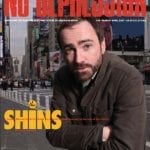Christine Smith – Old school
On Christine Smith’s debut album, Tomorrow Blues, the first and last things you hear are some of the very first sounds the singer ever recorded: excerpts from cassette tapes she made as a child, singing for her grandmother.
“My whole family would gather around the tape recorder,” she recalls. “I had been playing the piano since I was 4, so it would be, ‘Get Chrissie to play the piano and sing on the tape for the relatives.’ When I listened to them, I felt I had to include that. This first record is who I am.”
From those old family recordings, to liner notes that quote Duke Ellington’s “Solitude”, to Smith’s own penchant for Tin Pan Alley songwriting and musical theater dramatics, Tomorrow Blues is steeped in a sepia-toned sensibility. You’d be forgiven for checking the recording date on the disc just to ensure that the album isn’t made up of some old 78s rescued from a flea market, or perhaps a demo acetate for an unproduced musical from the 1930s.
Listen to the fire-escape romance of “The Car Alarm Choir Lullaby”, the nocturnal reflections of “Age Of Indifference”, or the compressed melodrama of “Down The Street”, and you can’t help but think they don’t write ’em like this anymore. Anachronism is something Smith eagerly embraces.
“I don’t really listen to modern music, and I wanted to put that across to people,” Smith says. “I am technically in the dark ages, in terms of what I like. I listen to cassette tapes and vinyl. I don’t have an iPod. I like to think that I can keep up the tradition of that kind of music — great American songwriters. They don’t write ’em like that anymore. There is an innocence to them that I miss about a lot of modern music.”
Smith’s professional music career began after high school, when she moved to England and landed a gig as music director on a weekly comedy satire stage revue. Eleven years later she returned to New York, gigged in a couple of postpunk outfits, and then found work onstage or in the studio with such diverse acts as Crash Test Dummies, Jesse Malin, Ryan Adams and Marah.
“I feel really lucky to work with the people I have worked with,” she says. “I have learned so much from everybody and everything. I have gotten so many opportunities to travel, to learn a lot about performing, songwriting, recording, and the music business in general.”
Although Tomorrow Blues was a long time coming, Smith says it came together relatively swiftly over the course of eight sessions, mostly recorded at the Brooklyn home studio of Kirk Henderson, bassist and keyboardist with Marah.
“I did everything in one or two takes,” she says. “I played almost everything on it myself. It was a nice, crazy process. I never knew what I was going to record next, what instrument I was going to record next, or where we were going to record next. ‘Hey, let’s record the guitar in the bathroom. Let’s beat this kick drum with a mallet covered in gaffer’s tape in the kitchen. Oh, somebody’s watching a football game in the next room.’ You can hear the toilet running in the background of another track. I like that stuff. It’s ambience.”
What you mercifully can’t hear on Tomorrow Blues is a straightforward, shallow love song. “I think almost every song has an element of a love song in it, an element of romance, but it is all caught up with lost love, expired love, unrequited love,” she observes. “I am not interested in writing anything particularly clever or angry or political. I find most of the time people find it refreshing because it is very honest. People identify with it a lot, and from what people have told me, it is pretty emotional. I think that is sweet. I’d like to keep it that way.”




